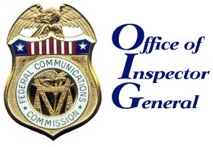A Credible Inspector General Would Make FCC More Credible - Part 2
01 06, 10 16:30

Thus today’s NY Times has an article about Justice IG Glenn Fine questioning the DOJ preparedness for WMD attacks. What, by contrast is the FCC IG investigating?
Well, the Universal Service Fund, Video Relay Service, and E-Rate programs involve billions of dollars and there is always going to be fraud there. And OIG has been busy pursuing these. (Although some of us wonder why OIG is the first line of defense here and shouldn’t there be another office checking on this persistent fraud closer to the policy side.)
On the internal side, the 4/09-9/09 IG Report finds “that after the Commission spent $3 million on Consumer Information Management System (‘CIMS’), the system did not work.and “ OIG concluded that mismanagement of the CIMS development project by contractor and Commission employees resulted in the failure of the CIMS project.” (p.37) It wasn’t clear what they thought should be learned from this of if any heads rolled.
We also learn that someone in Personnel took inappropriate action in hiring a relative. (p. 38). But those are the only internal issues. The previous IG report under the previous IG also only dealt with these internal issues.
Thus while DOJ’s Fine finds global issues to look into to improve DOJ, apparently FCC’s IG waits for the phone to ring. As I wrote previously, both IGs have the same legislative charter.
They are both obligated by 5 USC App. 4(a)(2)
Indeed, one could argue that the FCC IG has more independence from the FCC Chairman than the DOJ IG has from the Attorney General in that the DOJ IG has legislative restrictions on certain sensitive criminal and intelligence matters while the FCC IG has no such restrictions!to review existing and proposed legislation and regulations relating to programs and operations of such establishment and to make recommendations in the semiannual reports required by section 5 (a) concerning the impact of such legislation or regulations on the economy and efficiency in the administration of programs and operations administered or financed by such establishment...
So if the FCC is looking for something substantive to investigate to learn rom the past and improve future FCC operations, here are some topics to consider:
- How is the 800 MHz rebanding going and was it really a good idea?
- Indeed, how did the 800 MHz problem arise in the first place? Was it that unpredictable that the Nextel use might result in public safety interference? wasn’t it similar in some ways to the Channel 14 and 69 problems if the early 1980s, e.g. WVEU-TV Atlanta?
- How did it happen that lqrge numbers of wireless microphones were sold to noneligible parties creating a de facto reallocation of the UHF band and waht can be learned to prevent future de facto reallocations?
- How did it happen that no one remembered to kick all wireless microphones out of 700 MHz when they were auctioning the band for CMRS?
- Why did it take 10 years for VSAT complaints of interference from police band radar detectors to result in a new rule to prevent such emissions?
- Why did it take almost 2 years to act against a company selling GPS jammers?
- Indeed, is present enforcement of FCC equipment marketing rules credible?
- If someone marketed a new electronic device that caused massive interference to other spectrum users, how long realistically would it take FCC to respond based on precedents? (Consider both the case of marketing illegal devices, e.g. GPS jammer, or legal devices, e.g. radar detector.) One might think the large industry trade associations such as CTIA, APCO, NAB, and MSTV would be or should be interested in such a topic.
These points focus on spectrum issues, but I am sure that there are similar points in other aspects of Title II and Title III policy implementation.
blog comments powered by Disqus



![Validate my RSS feed [Valid RSS]](valid-rss-rogers.png)

